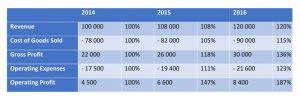
How your business reports and pays income tax depends on how it’s structured. Sole proprietorships, partnerships and some LLCs report business income on personal tax returns. The income is then subject to personal tax rates, which can affect the final tax amount. Businesses may also owe state and local taxes, depending on the type of business, the products and services provided, and whether they have employees. Schedule K helps provide a complete picture of each owner’s financial benefits or responsibilities.
- Call us at the toll-free number at the top right corner of your notice or letter.
- These payments include estimated taxes on behalf of the shareholders for their share of the income, as well as employment taxes for salaries paid to employees, including shareholder-employees.
- While I’ve arbitrarily set the salary to $40,000, you absolutely must verify the salary you pick for a one-person corporation is reasonable.
- However, profits and losses in S Corps pass directly to shareholders’ personal tax returns, avoiding corporate income tax.
- You can always boost the withholding from your employee salary to cover that obligation throughout the year.
What Is ‘Reasonable’ Compensation?
If they think your compensation is too low, they can recharacterize your distributions as wages, and you’ll have to fork over payroll taxes. With an S Corp, you can avoid payroll taxes on any profits you make from your business, as opposed to a sole proprietorship – where you have to pony up payroll taxes for 100% of your earnings. First, an S corp must use Form W-2 (Wage and Tax Statement) to report salaries and wages paid to its employees and owner-employees. S corps can then treat these salaries and wages as an expense when calculating the company’s profits and losses.
Filing Requirements: IRS Form 1120S Return for an S Corporation
Get started with Taxfyle today, and see how filing taxes can be simplified. Set your business up for success with our free small business tax calculator. Shareholders must have sufficient basis in their stock and loans to the corporation to deduct the losses. Retirement plans are a beneficial strategy to reduce taxable income while planning for the future. An S corporation is a particular type of corporation recognized under Subchapter S of the Internal Revenue s corp payroll Code.
Filing Federal Quarterly Payroll Taxes
- Shareholders pay income taxes on their earnings, but the business itself does not pay income tax.
- If a shareholder isn’t performing work for the company they will not be an employee and instead would receive a K-1 for passive income.
- This practice not only aids in financial reporting but also secures compliance with tax regulations.
- You’ll also need to record your payroll transactions into your accounting system.
- Paychex’s scalable solutions grow alongside you, quickly adapting when you add new employees, open new locations, or expand your benefits packages.
- Hiring a full-time accountant for the business is of course an option too—and their salary is tax-deductible.
Paychex payroll tax solutions deliver advanced reporting tools and scalability so you can make smarter decisions about compensation, hiring, and business expansion. For tax purposes, you can elect S Corp tax treatment to keep your taxes (relatively) retained earnings balance sheet simple and claim the profits on your personal tax return, instead of paying corporate taxes. So, what stops S corporation members from taking all their income as a distribution?
Penalty relief by administrative waiver

The due date for filing Form 1120-S is typically the 15th day of the third month following the end of the tax year. For fiscal year filers, the due date is the 15th day of the third month after the end of your fiscal year. Chat with a CPA or tax professional to make sure you’re aware of your state’s S corporation rules. Because Carl’s Sandwiches is an S corp, you’ll only have to pay self-employment tax on the $60,000 salary, and not on the $100,000 distribution. For example, let’s say you have a 50% ownership stake in Carl’s Sandwiches, a successful chain of sandwich shops that recently filed for S corporation status with the IRS.

Prioritizing the implementation of accounting advisory services

Form 1099 helps maintain transparency about an individual’s or a business’s income, ensuring that the correct amount of tax is reported and paid. Ensuring compliance with federal, state, and local payroll tax regulations is paramount for S Corp owners to avoid penalties and maintain financial stability. Understanding payroll tax requirements is a critical component of fulfilling legal obligations. Failure to adhere to these regulations can result in significant fines, interest charges, and even potential legal action against the business.


For example, ONESOURCE corporate tax software has modules for tax planning and preparation that can help streamline the process and make tax preparation more efficient. ONESOURCE can also automate indirect tax calculations, which is especially helpful if the business is selling a high volume of products or is doing business across state lines and is collecting sales tax. In any case, automating the most time-consuming aspects of the tax process can save money and give business owners peace of mind that their corporate tax filings and reports are as accurate as possible. S corp business owners in eligible states who elect the PTET option also receive a state tax credit on their individual taxes to offset most or all the tax paid by the business. PTET rules are different in each state, however, and not all states have them, so consultation with a tax professional is advisable.
Small Business Solutions. Simplified.
- Some states and local governments offer tax incentives and tax credits to help ease the burden and support small business growth.
- This means business profits are added to other income, such as wages and investments, to determine the correct tax bracket.
- This efficiency allows S corporation owners to focus on their business operations, knowing that their payroll responsibilities are being managed effectively.
- Getting your salary right is crucial because paying too little can raise red flags with the IRS and may be viewed as an attempt to avoid payroll taxes.
- Distributions to shareholders from an S corporation are generally not subject to self-employment tax.
- But in many situations where $40,000 is the appropriate wages amount, this amount of federal income taxes will pay the federal income taxes.
Managing S-corp payroll requires careful tracking of both salary and distributions. Paychex’s reporting tools make it easy to manage all the details and ensure compliance with IRS rules on reasonable compensation. Our analytics dashboard helps you monitor the key payroll and HR data you need to spot trends and make informed decisions. You can also quickly generate reports showing payroll history, tax withholdings, and distribution patterns to support compensation decisions during tax Bookstime time or in case of an audit. Just like S-corp owners, shareholders who work for the business must receive a regular salary that aligns with industry norms. Paychex helps you document shareholder responsibilities and maintain reasonable compensation levels that satisfy IRS requirements while managing standard payroll for your other employees.
- However, shareholders who incur out-of-pocket expenses related to the business cannot be deduct them on their tax return.
- Partners then report their share of a partnership’s profits, losses, deductions and credits on their individual tax returns using Schedule K-1 on Form 1065, U.S.
- The shareholder reports the profit or loss from Schedule K-1 on their individual taxes, usually on Form 1040.
- These taxes include personal federal income taxes the company withheld from an employee’s pay as well as Social Security and Medicare taxes.
- Discover the solution to better payroll management to save valuable time, avoid pitfalls, and grow your business confidently.
- You are, after all, your best employee, so let’s make sure you get this right.
The tax rate an owner/shareholder pays on S corp profits is determined by their individual income-tax rate, which can be anywhere from 10% to 37%, depending on the filer’s total taxable income. S corporations are taxed as pass-through entities, meaning they do not pay corporate income taxes. Instead, all income, losses, deductions, and credits are passed through to the shareholders, who report these items on their individual tax returns. S Corps do require some record-keeping, but it’s nothing like what a C Corp might deal with. You also avoid “double taxation,” one of the major drawbacks to the C Corp lifestyle.
